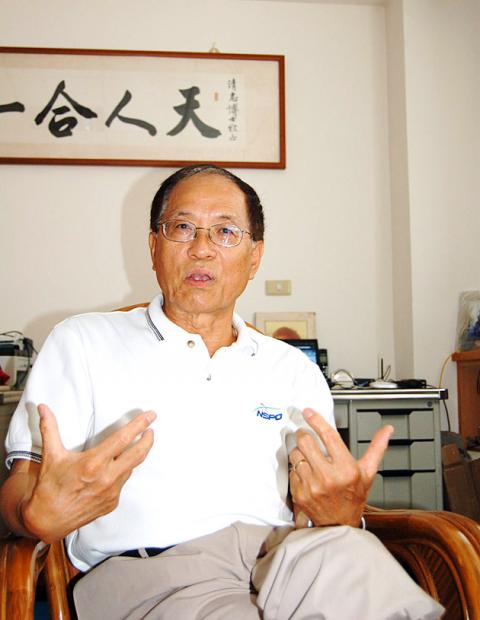Former National Science Council official Shieh Ching-jyh (謝清志), who was acquitted of corruption charges after a five-and-a-half-year judicial ordeal, said he was neither surprised nor happy at the court ruling declaring him innocent and called for the judicial system to avoid becoming a tool for political administrations.
Shieh made the remarks in an interview with the Chinese-language Liberty Times (the Taipei Times’ sister paper) on Friday.
Shieh in December 2006 was indicted on corruption charges for allegedly collaborating with a private company to profit from a construction project. He was accused of helping his friend, Hsu Hung-chang (許鴻章), win a contract for a construction project in an industrial park in Tainan to reduce vibrations from the high-speed rail (HSR) affecting the park. The project was initiated to address the concerns of high-tech companies in an industrial zone next to the railway track who feared that tremors from passing trains could damage their products.

Photo: Huang Chien-hua, Taipei Times
Shieh was acquitted of all charges in the re-trial of the first trial held at the High Court’s Tainan branch on July 11, and on the basis of the Fair and Speedy Criminal Trials Act (刑事妥速審判法), the prosecutors decided not to appeal the ruling.
The act stipulates that unless the rulings of the first and second trials are against the law or unconstitutional, prosecutors have to abide by the first and second rulings if they are the same and may not appeal to the Supreme Court for a third trial.
Shieh said on Friday that the many earthquakes that have happened over the past six years have proved that the anti-vibration construction for the high-speed rail works.
Looking back, Shieh said that most of the companies in the park were worried the vibration of the high-speed trains would affect the quality of their products, with some even backing out of their leases and setting up in Singapore.
The Chinese Nationalist Party (KMT) had not taken care of the problem for seven years, so the Taiwan Semiconductor Manufacturing Co had written to the National Science Council after the Democratic Progressive Party (DPP) took over the presidency in 2000, Shieh said.
Shieh said that despite all the effort he had expended in the project, he was still accused of a crime that had not only seen him detained for 59 days, but also besmirched his name.
Shieh said he was thankful to all the family members and friends that had cared for and encouraged him while he had been imprisoned, adding that “in comparison to the people jailed for decades over the Kaohsiung Incident or former president Chen Shui-bian (陳水扁), who is still behind bars, I’m pretty lucky.”
Born in Cigu District (七股), Greater Tainan, the 70 year-old Shieh received his PhD in aerospace engineering at the University of Michigan and had worked at the Rockwell Automation as a guidance and control analyst prior to his return to Taiwan.
After his return, Shieh became the nation’s main promoter of aerospace technology, presiding over the launch division when the Formosat-I satellite — formerly known as ROCSAT-1 — was launched in 1999 by Lockheed-Martin at Cape Canaveral Air Base, and was also on the planning committee for Formosat-3.
Speaking of the future, Shieh said he would retain the same hopes he had in 1995 when he returned to Taiwan: that Taiwan’s judiciary system would improve and there would be no more wrongful imprisonment.
Shieh added that he hoped the judicial system would not be relegated to the status of a tool that just serve whichever administration was in power.

Taiwanese can file complaints with the Tourism Administration to report travel agencies if their activities caused termination of a person’s citizenship, Mainland Affairs Council Minister Chiu Chui-cheng (邱垂正) said yesterday, after a podcaster highlighted a case in which a person’s citizenship was canceled for receiving a single-use Chinese passport to enter Russia. The council is aware of incidents in which people who signed up through Chinese travel agencies for tours of Russia were told they could obtain Russian visas and fast-track border clearance, Chiu told reporters on the sidelines of an event in Taipei. However, the travel agencies actually applied

Japanese footwear brand Onitsuka Tiger today issued a public apology and said it has suspended an employee amid allegations that the staff member discriminated against a Vietnamese customer at its Taipei 101 store. Posting on the social media platform Threads yesterday, a user said that an employee at the store said that “those shoes are very expensive” when her friend, who is a migrant worker from Vietnam, asked for assistance. The employee then ignored her until she asked again, to which she replied: "We don't have a size 37." The post had amassed nearly 26,000 likes and 916 comments as of this

New measures aimed at making Taiwan more attractive to foreign professionals came into effect this month, the National Development Council said yesterday. Among the changes, international students at Taiwanese universities would be able to work in Taiwan without a work permit in the two years after they graduate, explainer materials provided by the council said. In addition, foreign nationals who graduated from one of the world’s top 200 universities within the past five years can also apply for a two-year open work permit. Previously, those graduates would have needed to apply for a work permit using point-based criteria or have a Taiwanese company

The Shilin District Prosecutors’ Office yesterday indicted two Taiwanese and issued a wanted notice for Pete Liu (劉作虎), founder of Shenzhen-based smartphone manufacturer OnePlus Technology Co (萬普拉斯科技), for allegedly contravening the Act Governing Relations Between the People of the Taiwan Area and the Mainland Area (臺灣地區與大陸地區人民關係條例) by poaching 70 engineers in Taiwan. Liu allegedly traveled to Taiwan at the end of 2014 and met with a Taiwanese man surnamed Lin (林) to discuss establishing a mobile software research and development (R&D) team in Taiwan, prosecutors said. Without approval from the government, Lin, following Liu’s instructions, recruited more than 70 software